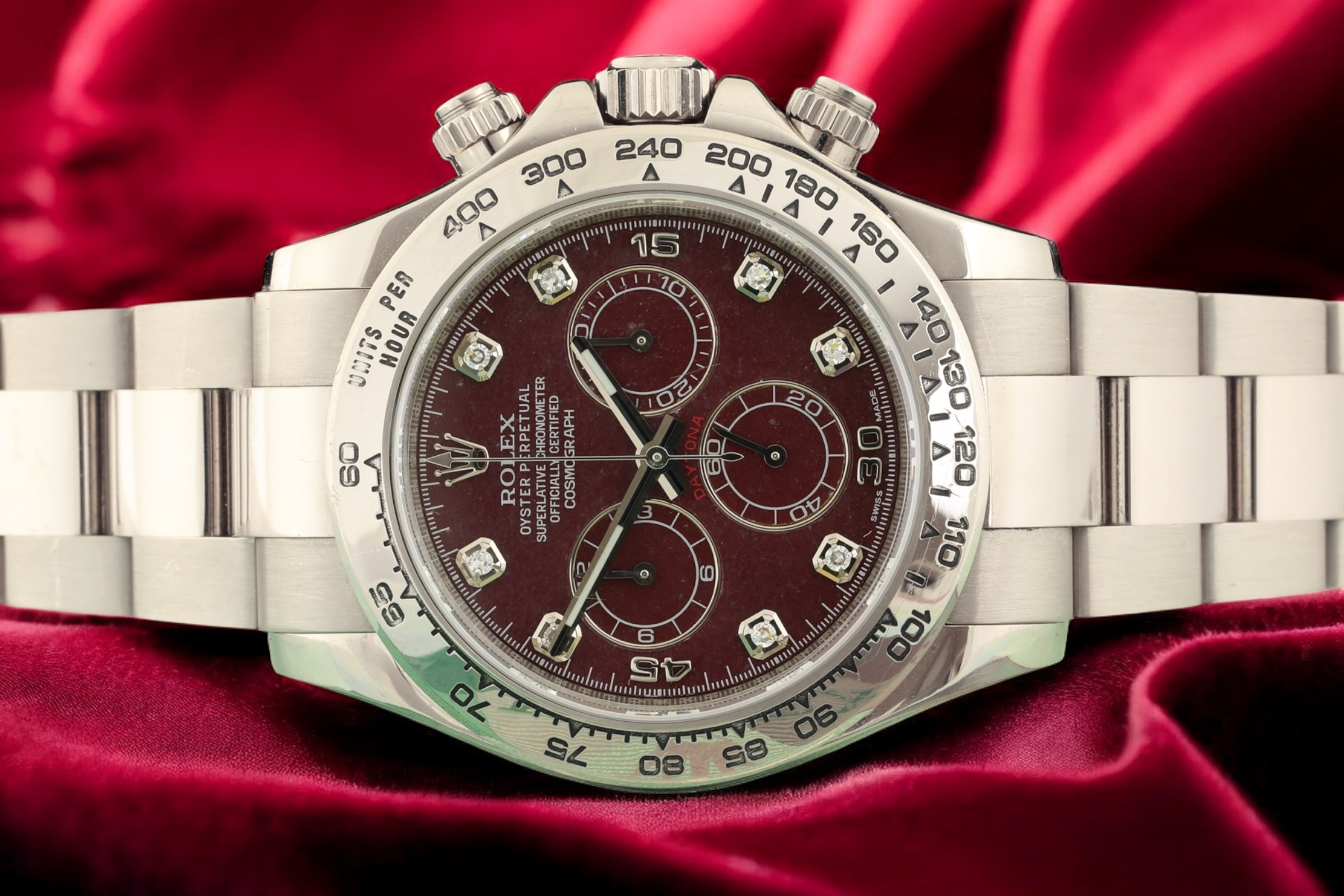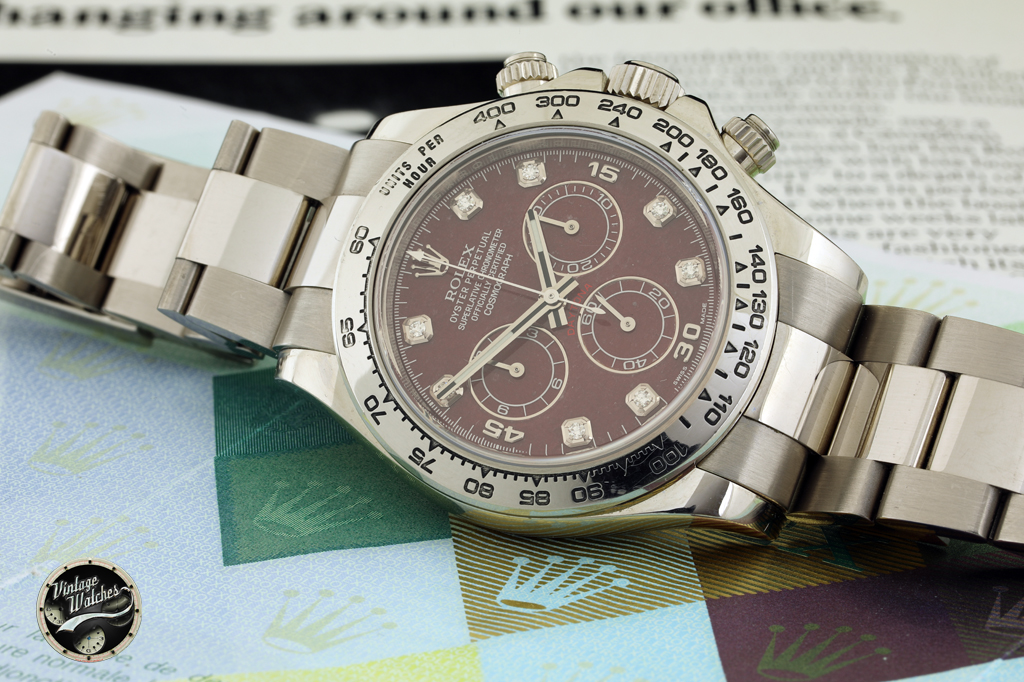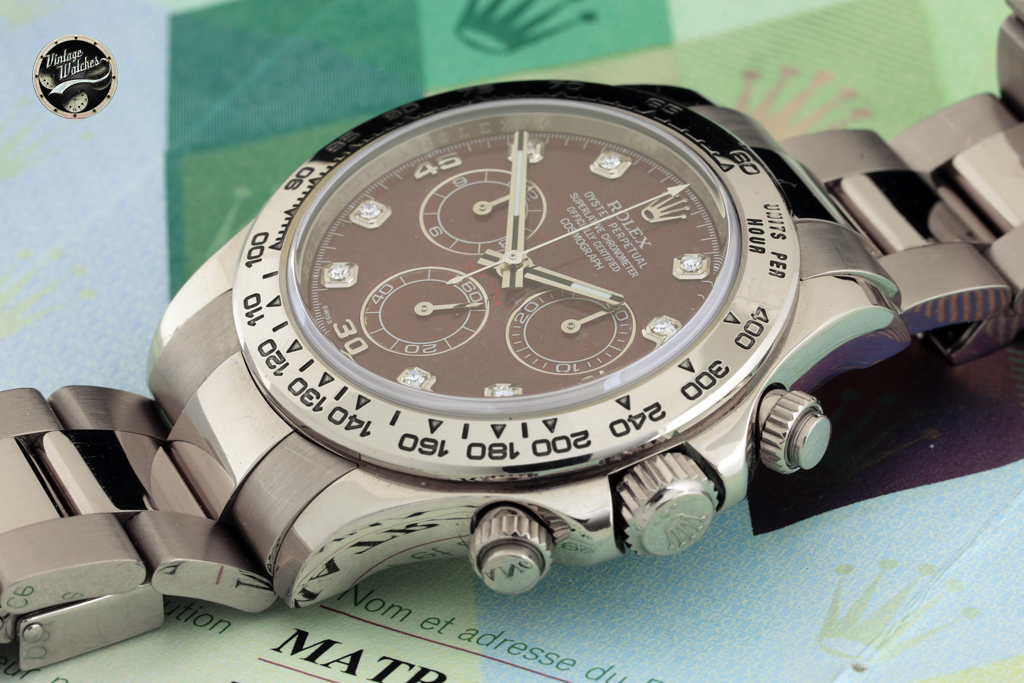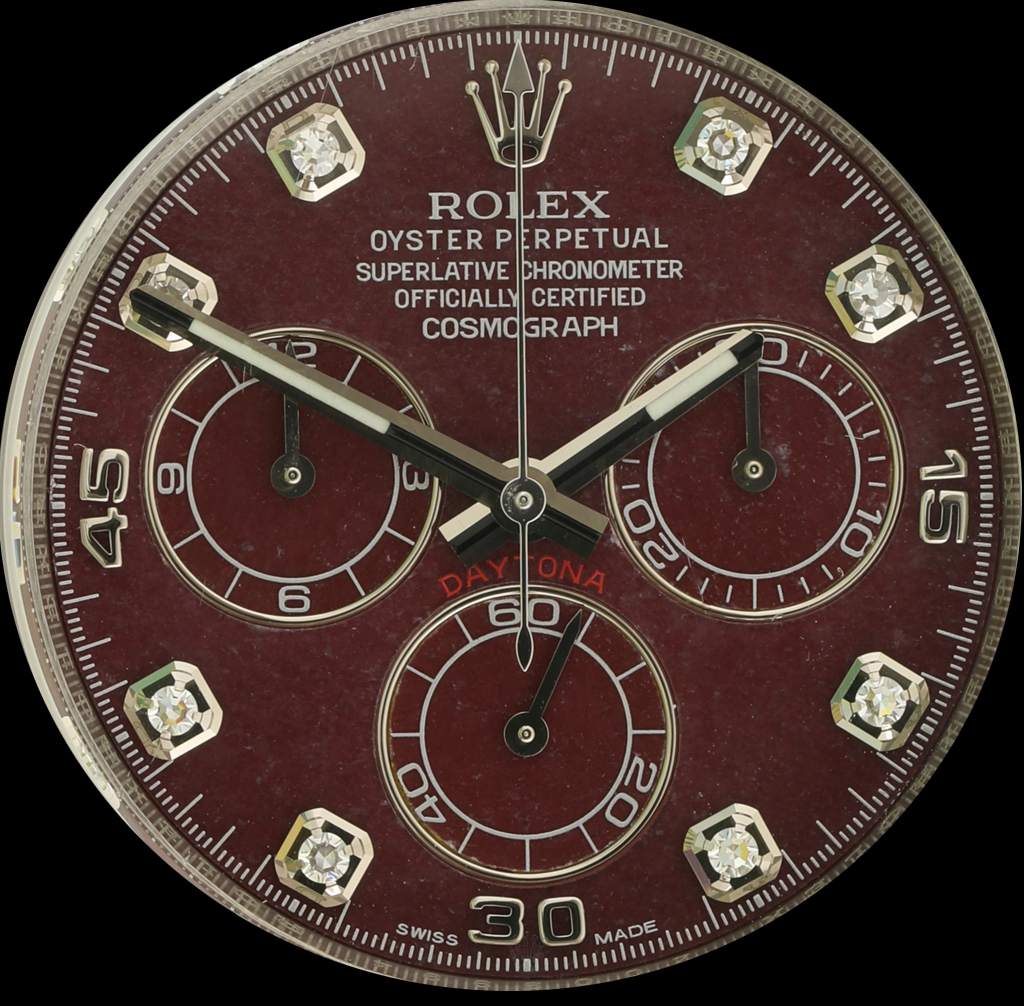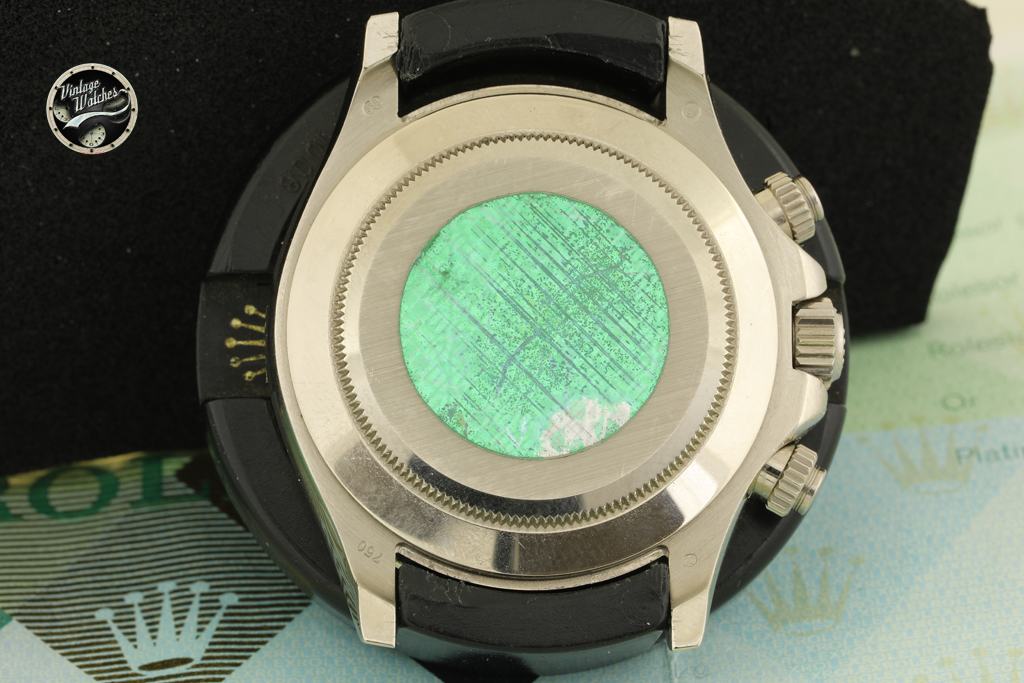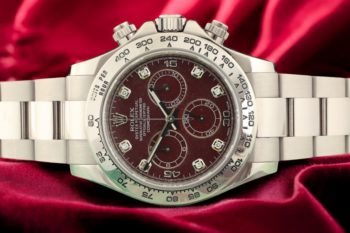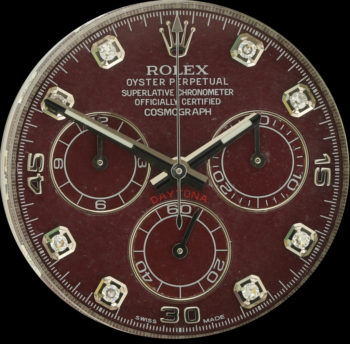| Marchio - Brand | |
|---|---|
| Modello - Model | |
| Referenza - Reference | |
| Seriale - Serial Numbers | |
| Anno - Year | |
| Documenti originali - Original Papers | |
| Stato dell'orologio - Availability |
- Rolex Daytona white gold ref. 116509 Rubelite Diamond Dial
- Original Rolex Box & Papers
- Lifetime warranty on originality
Overhauled – One year warranty on function
Rolex Daytona ref. 116509 Rubelite Diamond Dial Box & Papers
Prezzo su richiesta - Call For Price
Serial Z0099**,2006
Case:
in white gold in very good condition
Serial and reference are perfect between the lugs and into the rehaut
Dial:
original Rolex Rubelite dial
Diamond indexes
very good condition
Caseback:
original Rolex 2119 in white gold
original green sticker on the outside
very good condition
Bracelet:
Oyster bracelet in white gold ref.78499 SEL
clasp OP6 (2006)
Accessories:
original Rolex box & papers
Price on Request
The vintage Daytona spent much of its life as a minimalist sports watch, with a steel or yellow gold case with a panda or reverse panda dial.
The exotic Paul Newman dials and set references 6269 and 6270 were an occasional hint of something unusual. Rolex really began to “dress up” its sports chronograph when the watch received what was perhaps the most comprehensive makeover a watch has ever received.
By anabolizing the case from 36 mm to 40 mm, reshaping it, adding a sapphire crystal, and introducing an automatic movement, Rolex created one of the most sought-after watches on the planet, and thus the now legendary “waiting list” was born!
The automatic Daytona expanded the line with watches in steel, gold and white gold, with precious metal references also offered on leather straps. Rolex also radically revised dial options and began setting both dials and bezels with diamonds and other precious stones.
Making stone dials is a very delicate process and waste levels are very high, as the incredibly thin piece of stone required is fragile, breaking very easily. The manufacturing process basically involves cutting a disk of the stone (homogeneous) and then machining it to a super thin slice that is then applied to the base of the brass dial. Sounds easy, doesn’t it? It is not, and it requires great skill and perseverance on the part of the craftsmen. Natural products are always unique, and this is one of the seductive aspects of stone dials, as each one is unique and therefore special to its owner.
The first stone dials were mounted on Daytona 16516 in platinum. Four or five Daytona, unique in their configuration, commissioned in the 1990s by former Rolex CEO Patrick Heiniger and given as gifts to friends and associates. To these extremely rare watches sought after by collectors around the world, Rolex dedicated a special five-digit reference: ref. 16516 with dials in mother-of-pearl MOP, lapis lazuli ,turquoise and apparently also one in coral (you can see one on my blog).
In the early 2000s, Rolex introduced a quartet of white gold Ref. 116519 Daytona watches with colorful dials. These watches are known collectively as the “Beach Daytona” series because of their vibrant dials in yellow, light blue, green, and pink. The first two were made of yellow and pink mother-of-pearl, while the other two were made with stone dials: chrysoprase and turquoise.
After 2001, when the new reference 116520 and co. were listed, the Daytona Perpetual became commercially available with five different dials made of hard stones: sodalite, coarse garnet and later rubelite ,chrysoprase, turquoise and meteorite, as well as numerous shades of mother-of-pearl. Let’s look at them one by one.
Sodalite is a blue mineral used in jewelry as an ornamental gemstone. First discovered in the early 1800s in Greenland, it became popular as an ornamental stone following a large quantity discovered in Ontario, Canada. Its name comes from the very high sodium content in the stone, which is very hard but also quite brittle. Often confused with lapis lazuli, it is different because of the white stripes running through it. Shades can also vary, from light powder blue to deep blue. A few watches feature a sodalite dial with applied Arabic numerals, which can be read as minutes or seconds when the chronograph is in use. The Daytona sodalite dial is a rare sight to see and was available in two versions, with diamond-set hour markers and also with Arabic numerals. The latter configuration is rarer.
The Daytona “Grossular” also featured brilliant-cut diamond hour markers with white gold edges.
Rolex introduced Ref. 16519 in white gold also with a rubelite garnet coarse dial. This material is available in several color variations, but the Swiss brand used only red.
“Glossular,” is a kind of garnet with a color tending to a very veined warm brown, while Rubelite is a fine tourmaline with a deeper red color more and uniform.
Chrysoprase is an opaque mineral of hydrated phosphate of copper and aluminum. It comes in various shades of blue and green and is popular for its intense hue.
Both the Beach Daytona in chrysoprase and the one in turquoise have applied Roman numerals.
Another stone Rolex is known to have worked with is meteorite. Rolex was the first manufacturer to use meteorite slices to create completely unique dials by combining them with other metals. Precious ones such as 18K gold or 950 platinum to produce truly collectible versions of their most important watches.
Meteorite dial
Finally, mother-of-pearl, although not made of stone, mother-of-pearl (MOP) imparts the same amount of glamour as gemstones. Rolex began fitting mother-of-pearl into dials in the 1980s and it has since become a popular element of many models. For the Daytona range, Rolex uses different types of mother-of-pearl: white, pink, yellow mother-of-pearl and Tahitian or black mother-of-pearl, which has a deep purple hue with pinkish and green tones.
CONFIDENTIAL NEGOTIATION
ARE YOU INTERESTED IN THIS WATCH?
DO YOU WANT MORE PHOTOGRAPHIC DETAILS?
CONTACT US OR WRITE US IN CHAT
Request info
Contact Us
- E-mail: info@stefanomazzariol.it
-
Stefano Mazzariol: +39 335 6681944

-
Mobile (Office) – Virginia: +39 333 4427214

- Office: +39 0586 895028


